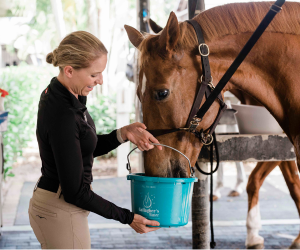What Is Horse Slavery?

I was astonished to see photos and videos of protesters who dangerously barreled into the show jumping arena at the European Championships in Rotterdam this week.
Two adults ran into the ring with the words “stop horse slavery” painted on their shirtless bodies. They held signs that said “horse beating is not a sport”. This was the first time I’d ever seen real political protest in the world of horse sport with my own eyes. And it filled me with dread.
I’ve worried that this day would come – that we, as a sport and an industry, would have to defend ourselves as animal lovers and advocates, in a world that has become increasingly more divided and incendiary.
But the way we respond to something like this is important.
The group responsible for the antics in Rotterdam believe in veganism, and that animals should be able to live out their lives doing what they were designed to do – i.e., not being put to work for humans.
It’s a noble thought, and I can’t say that I condemn them for it. But what irks me is the extreme messaging. The signs they held and the words they chose are akin to the “in your face” anti-abortion protesters who regularly clogged up the sidewalks on my college campus.
They have a right to share their message and express their point of view. But what makes me sick to my stomach is the lack of understanding here. It’s easy to throw stones when you don’t know anything about us.
So what is “horse slavery“? I don’t want to turn this into a history lesson, but humans have had a working relationship with horses for centuries. Protesters are right, in that we don’t rely on the animals as we once did. And thus, horses have become even more domesticated over the years – bred for sport and companionship, above anything else.
“It’s hard to explain to the average person the amount of care and work that goes into keeping a horse healthy and happy. It’s not for the faint of heart.”
When I think back on the horses I’ve owned in my lifetime, I can honestly say I would have been doing them a disservice if I had bought them only to live out their lives in a field. Horses are incredibly intuitive and athletic creatures. So many of mine excelled in their “jobs” under saddle because they loved the challenge of the work. Many others were so kind and tolerant because they too craved the bond between us.
It’s hard to explain to the average person the amount of care and work that goes into keeping a horse healthy and happy. It’s not for the faint of heart. I see this happen time and time again across the board with animal advocates. Livestock is not easy to maintain, but we’re so quick to condemn all farmers for awful living conditions or point the finger at every racetrack trainer in the aftermath of freak accidents.
There are thousands of horses out there in the world who are in need of great intervention. So many are bussed to slaugherhouses. Others are starved or abused, sometimes because of ignorant, uneducated owners. But that’s not what’s happening at the top levels of show jumping, dressage or three-day eventing.
Yes, we should be called out for bad practice when it happens. And we should be open to criticism that may help find solutions. But to accuse equestrians as supporting “horse slavery” is a gross misrepresentation of an entire industry of people who I know put the horse’s needs well above their own time and time again.


